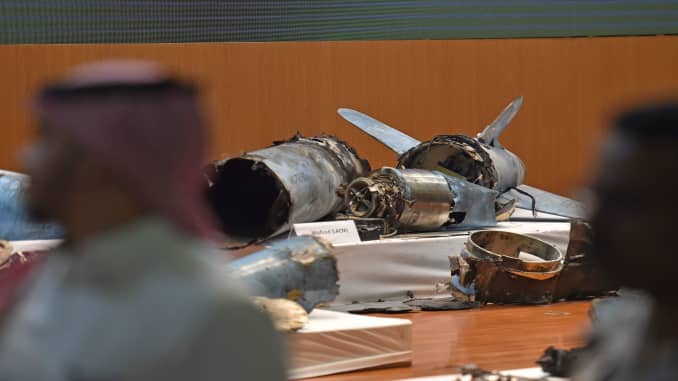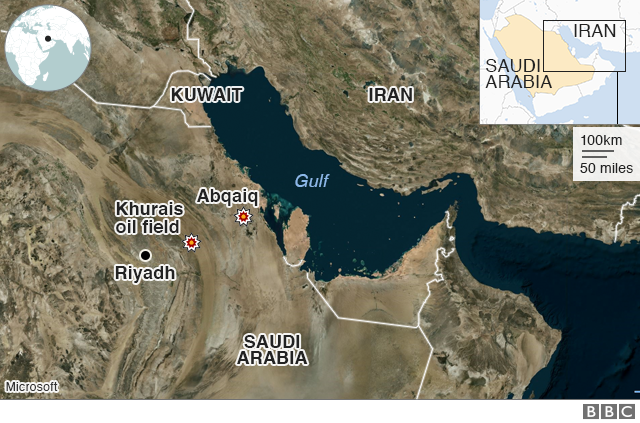The Islamic Republic of Iran -- Calling The Shots
"Because of the tension and sensitive situation, our region is like a powder keg."
"When these contacts come too close, when forces come into contact with one another, it is possible a conflict happens because of a misunderstanding."
"[The Revolutionary Guard forces are ready for a counterattack if America responds.] Wherever they are, it only takes one spark and we hit their vessels, their air bases, their troops."
"[The Islamic Republic is ready for] full-fledged [war]."
"All American bases and their aircraft carriers in a distance of up to 2,000 kilometers around Iran are within the range of our missiles."
Iranian Brig.Gen. Amir Ali Hajizadeh
"[The Saudi Arabian area with char marks, the Abqaiq plant and the Khuraus oil field includes] storage tanks and processing and compressor trains -- which greatly increases the likelihood of a strike successfully disrupting or destroying its operations."
Center for Strategic and International Studies, Washington
"Amid all the calls for de-escalation, Iran has now launched an unprecedented attack on the world's energy supply."
"There is no evidence the attacks came from Yemen."
U.S. Secretary of State Mike Pompeo
"[Pompeo's remarks are] blind and futile comments."
"The Americans adopted the 'maximum pressure' policy against Iran, which, due to its failure, is leaning toward maximum lies'."
Abbas Mousavi, Iranian Foreign Ministry
"The main point for Iran, in my opinion, is not necessarily to derail a meeting between Trump and Rouhani but to increase its leverage ahead of it."
"By carrying out such a major attack, Iran wants to send the message that the only way to decrease tensions is to comply with its demands regarding sanctions relief."
"There will be no political benefit for Trump in a meeting with Rouhani if this meeting sends the message that the U.S. simply surrendered to Iranian demands."
Michael Horowitz, head of intelligence, LeBeck International, Bahrain
 |
Workers fix the damage in the Aramco's Khurais oil field
in Saudi Arabia, Sept. 20, 2019, after it was hit during Sept. 14
attack the U.S. alleges Iran carried out.
|
Last Saturday's surprise attack on oil facilities in Saudi Arabia has that oil-producing country reeling, both in disbelief that their own systems failed to warn of incoming attacks and as did the warning system of the United States, both on land and at sea. As in 'how did they manage that feat?', but no one is as yet any the wiser, or if they are, it is not being publicly divulged, that a huge failure to detect the threat was not intercepted.
Although the Houthi rebel contingent in Yemen, supported by Iran's Revolutionary Guard and Hezbollah, claimed to have been responsible for the drone attacks knocking out over fifty percent of Saudi oil production and 5% of the world oil supply, U.S. intelligence aided by satellite imagery indicate the direction of the 19 points of impact on the Saudi facilities were launched west-northwest of the targets, in the direction of Iran or possibly Iraq, and not south, from Yemen.
Saudi investigators claim to have identified the cruise missiles used in the attack of Iranian origin. "There's no doubt that Iran is responsible for this. No matter how you slice it, there's no escaping it. There's no other candidate", pointed out a high-placed U.S. investigative official. A charge that Tehran was quick to reject. The heartland of Saudi Arabia's oil industry, with the globe's largest petroleum processing facility was hit with astonishing accuracy, far beyond the capability of Houthi forces, and in line with Iran's ongoing cruise missile technical developments.
 |
A picture taken on
September 18, 2019 shows displayed fragments of what the Saudi defence
ministry spokesman said were Iranian cruise missiles and drones
recovered from the attack site that targeted Saudi Aramco’s facilities,
during a press conference in Riyadh.
Fayez Nureldine | AFP | Getty Images
|
According to Saudi Aramco, the State oil giant, the attack cut production by 5.7 million barrels a day. No timeline for resumption of output was given, but it was expected that restoration would take weeks, if not longer. Tehran characterizes as "maximum lies", the charge by both Saudi Arabia and the United States that they were responsible, even though officials claim photographs indicate impacts consistent with the attack arriving from Iran's or Iraq's direction, not Yemen.
Irrespective of which, it is abundantly clear that the message Iran is sending is that if they cannot market their oil freely, and if their economy continues to suffer as it is doing at the present time, resulting from the increased sanctions imposed by the U.S., then no other oil-producer in the region will be assured that their shipments will reach their destination. Two days following the strike on the Saudi oilfield, the Revolutionary Guards took another ship into custody, arresting the eleven crew members.
The lengths to which Tehran is reaching into the region to disrupt and threaten and attack, attests to the desperation it feels over its economic situation worsening as time goes by, which is the intent of the U.S. administration in applying maximum pressure, but no one appears to have foreseen the lashback of bold and violent reaction from Iran. The previous downing of the U.S. drone, the ongoing threat to shipping in the Gulf, and this latest attack on Saudi Arabia calls out for a firm response.
So far, although there have been threats and counter-threats, no convincing reaction has yet taken place to inform Iran that its actions will not be tolerated. At the present time in actual fact, those actions are indeed tolerated. Washington claims to be awaiting direction from Riyadh on whether an imminent attack is being prepared before it takes action. What is obvious is that no one in the region wants an all-out war. New sanctions are being imposed on Iranian banking. And an increase of U.S. troops is in the books for the region.
"I would expect we would see more [sanctions].""The conventional wisdom out there that we've pretty much exhausted all the sanctions we can impose on Iran is completely false. There are many, many more things that can be done and there are many more actions in Treasury's pipeline. ...""We may be at seven on the sanctions dial and maximum pressure requires an 11."Mark Dubowitz, chief executive, Foundation for Defense of Democracies

Labels: Crisis Management, Iran, Middle East, Oilfield Attack, Sanctions, Saudi Arabia

<< Home